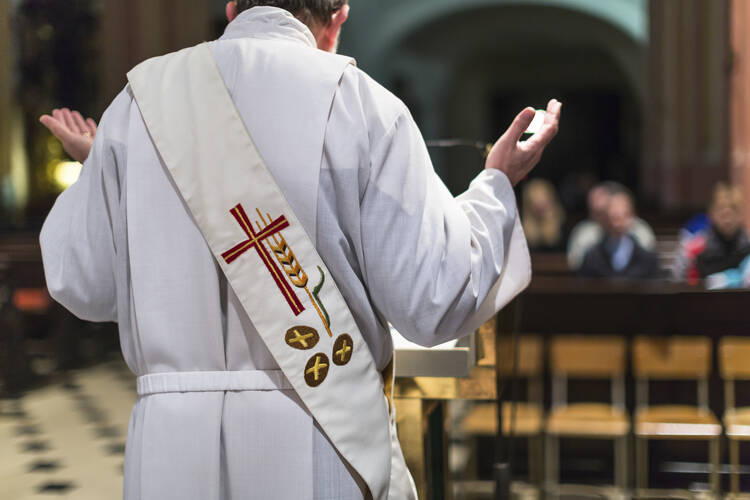I’ve only ever met one person of my generation—just barely young enough to be millennial—who claimed a calling to be a deacon. He was an Episcopalian. He was studying for a master of divinity degree at an eminent university more accustomed to producing graduates who aspire to lofty titles like chief executive officer and bishop. But he spoke about the deacon’s special role as a bridge between the hierarchy and the people, and about the humility and holiness of the calling. He spoke about it as a way to heal the church’s divisions. After a few minutes’ conversation in a doorway, he got me wondering for the first time about that calling for myself, though I was then still far from the age of 35, the minimum for a deacon in the Roman church. There was no shortage of times during those years, as a new convert to Catholicism, when I had been asked about becoming a priest; never had the diaconate come up.
How many of us have considered the diaconate for ourselves? Our Prayers of the Faithful often include hopes for priestly vocations, but how often for deacons? It has been half a century since the Second Vatican Council restored the permanent diaconate, including for married men, and now Pope Francis has established a commission to consider renewing the women’s diaconate. The possibility of this neglected order may soon concern a whole lot more of us.
Historians are therefore revisiting stories of deaconesses in the early church—trusted, powerful, significant women. Activists are drawing up battle lines around this latest threat to the familiar patriarchy. Less loud and less visible, surely, are the women and men who are quietly pondering and praying over the calling. Maybe they are imagining what they would preach from the pulpit or how they would soothe a baby they’d just baptized. Maybe they’ve begun mentioning the idea to their spouses or getting teased about it by their children.
We can bet the pope is ambivalent, at best, about a diaconate that welcomes women. In the past he has replied to the idea of women cardinals, for instance, with concerns that it would only further reinforce the clerical elitism he has sought to dispel. “Women in the church must be valued,” he once said, “not clericalized.” He rightly wants to celebrate a wider range of vocations in the life of the church, not just those with a rung on the hierarchy. Yet that has not stopped him from appointing men as cardinals. This is a clerical church. To set up “clericalism” as an outright barrier to some and not others only undermines the seriousness of a campaign to challenge its excesses.
Your Holiness, you are the pope, which is why (in addition to your particular wisdom and charisma) your opinion matters in the first place. Most of the rest of us aren’t popes, aren’t priests, aren’t deacons, aren’t even columnists for America. Our particular wisdom and charisma stays boxed in and silent when we gather with our neighbors for worship. We listen, over and over, whether or not what the clerics say is wise, charismatic or even coherent. Clericalism is the least of our problems. What we lack, rather, are voices—each other’s voices, each other’s wisdom. We get traces of it over coffee when the Mass is ended, but even then we are so unpracticed in speaking out our faith that we mostly stick to safer secular topics. When the priest walks by, we act like we were talking about the Bible readings.
This silence is more deadening than clericalism, especially when there are ever fewer actual clerics. The first and best antidote, always, is to allow the Spirit to speak more freely and confidently through us as laypeople. But at least as long as ours remains a church run by clerics, as long as we confer on their hierarchy a near-monopoly on voice, we should flood into the service of holy orders however we can. We must keep them holy, and honor the ways of our ancestors, but let doing so hold back no one with a true calling to preach and baptize as our God commands.
Should you become a deacon? Maybe. I don’t know. Sit with that beautiful possibility. Let it nag you, if it will. There are so many good callings in the world and the church, yet this one has been overlooked for far too long. The pope wants us to study it with fresh eyes. But let’s do more than study. Let’s flood it—with our vocations, our voices and our prayers.








